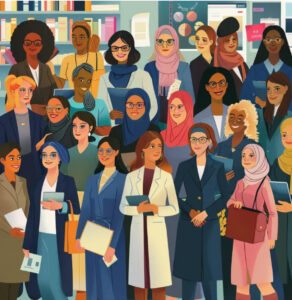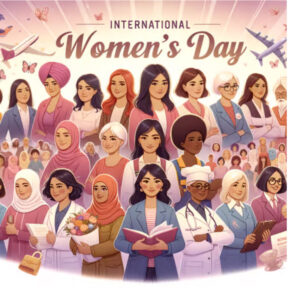By Mackie M. Jalloh
In the eastern hills of Sierra Leone’s Kono District, a 38-year-old woman named Mabinty bends over the soil, tending to a small vegetable patch. She’s a single mother of four, a survivor of intimate partner violence, and a determined entrepreneur who sells her crops to pay for her children’s education. Mabinty’s story is not rare. It mirrors the experiences of millions of African women whose resilience powers communities, even when institutions and systems fail them.
Yet, behind every story like hers lies a deeper question: Why, in the 21st century, are African women still fighting for the most basic rights—education, safety, economic inclusion, representation? And what does true empowerment look like beyond the speeches, campaigns, and symbolic gestures?
A Continent Built on the Backs of Unrecognized Labor
Across sub-Saharan Africa, women are the backbone of the informal economy. According to the International LabourOrganization, more than 85% of working women on the continent operate within the informal sector—market trading, agriculture, caregiving, domestic work—often without social protection or formal wages.
Political Representation: The 26% Threshold
Across sub-Saharan Africa, women hold just 26% of parliamentary seats—a meager increase from 25% in 2021. Despite constitutional mandates and quotas in over 40 countries, true parity remains distant—at the current pace, gender parity in legislatures could take until 2100.
Without political voice, women remain on the sidelines of decision-making. Representatives such as Senegal’s Thérèse Faye Diouf and Sierra Leonean women parliamentarians prove that change is possible—but persistent resistance and discrimination signal how far we are from systemic inclusion
In Sierra Leone, women constitute over 52% of the population. Despite this, they occupy less than 13% of seats in parliament and hold fewer than 20% of senior government positions. The disparities are stark, not only in governance but in health, education, and wealth ownership. Girls from rural communities remain the most vulnerable to early marriage, school dropout, and maternal death. Gender-based violence remains widespread, with limited access to justice or mental health care for survivors.
Yet women are not just passive victims of systemic neglect—they are often at the forefront of change.
First Lady Fatima Maada Bio: Disrupting the Status Quo
One of the most vocal advocates in West Africa today is Sierra Leone’s First Lady, Dr. Fatima Maada Bio. Since assuming office in 2018, she has ignited national and continental discourse on gender rights, launching high-impact campaigns like the “Hands Off Our Girls” initiative, which fights early child marriage and sexual violence. She has partnered with the United Nations, OAFLAD (Organisation of African First Ladies for Development), and regional bodies to push for policy reforms that prioritize girls’ education and women’s reproductive health.
Her activism is not without resistance. Conservative elements in Sierra Leone have pushed back, questioning her outspokenness and public visibility. But Dr. Bio has continued to advocate unapologetically for women and children, using her platform to demand that African governments shift from lip service to legislative action.
During the 2025 Strengthening Family Conference held in Freetown, she declared, “Empowerment is not charity. It is justice… To empower women is to recognize them not merely as beneficiaries of support but as agents of transformation.” Her keynote speech resonated far beyond Sierra Leone’s borders, touching on the moral urgency of protecting children and elevating women in every sector of life.
From Policy to Practice: Gaps Still Persist
Despite high-level advocacy, the translation of women’s rights into tangible outcomes remains slow. In many parts of Africa, legislative frameworks exist—laws criminalizing gender-based violence, mandates for female political representation, constitutional guarantees of equality. But enforcement is weak.
A 2022 study by UN Women found that only 9 out of 54 African countries have achieved gender parity in primary education, and just 3 countries have more than 30% female representation in parliament. Financial inclusion remains elusive; only 37% of women in sub-Saharan Africa have access to a bank account, compared to 48% of men.
Sierra Leone is making strides—free quality education for girls, an increase in female school attendance, and a Sexual Offences Court—but rural women still face hurdles of culture, distance, and poverty. Gendered stereotypes persist, branding women as subservient, dependent, or unfit for leadership.

Voices from the Grassroots: Power in the Periphery
True empowerment begins at the grassroots level. In the slums of Kroo Bay, Freetown, community women’s groups are teaching literacy to young mothers. In Uganda, rural female cooperatives are leveraging solar power to run sustainable farming businesses. In Nigeria, local journalists are spotlighting survivors of trafficking and harmful traditional practices.
One Sierra Leonean initiative, the Girls Advocacy Network, trains adolescent girls in leadership and civic engagement. Its alumni have gone on to represent their communities at international forums, challenging cultural taboos and pushing for menstrual equity in schools.
Yet these local champions often operate without funding, visibility, or institutional support. International aid still disproportionately flows through large NGOs rather than directly empowering local women-led movements. For change to be sustainable, these voices must be centered, not sidelined.
The Intersection of Gender, Poverty, and Policy
Women’s empowerment is not just a gender issue—it intersects with every development metric: poverty, health, governance, environment, and peacebuilding. According to the World Bank, gender equality could add $316 billion to sub-Saharan Africa’s GDP by 2035.
But for this potential to be unlocked, policymakers must prioritize structural reform over symbolic commitment. That means access to land for female farmers. Maternity protections and childcare in workplaces. Comprehensive sexuality education. Legal aid for survivors. Funding for female entrepreneurs. Safe transport systems. Equal pay. And most of all—representation in power.
Sierra Leone’s Gender Equality and Women’s Empowerment (GEWE) Policy is a critical step forward, but its success hinges on implementation. The recently passed Gender Equality and Women’s Empowerment Act mandates 30% women’s representation in cabinet and public offices—a significant victory. Yet implementation remains patchy in some districts, and cultural pushback threatens progress.
Maternal Health: A Stark Measure of Empowerment
Safe motherhood is a measure of societal equity. In 2000, Sierra Leone recorded the highest maternal mortality rate globally—1,682 deaths per 100,000 live births. Two decades later, that rate fell by 74% to 443 per 100,000 in 2020. But while the downward trend continues—falling to around 354 by 2023—the loss of life remains unacceptably high.
The reduction was driven by expanded healthcare access: free care for pregnant women, deployment of skilled staff, and integration into WHO facility networks. Rural midwife Theresa Kpaka, a mother of three in Bo, recalls nurses who saved her twins during complicated childbirth. Yet systemic gaps persist—postpartum hemorrhage and hypertension remain the deadliest threats, and unsafe abortions account for an estimated 10% of maternal deaths. Additionally, teenage mothers face elevated risks—a girl between 15–19 is 40–60% more likely to die in childbirth and more likely to experience stillbirth.

The Role of Men and Boys
Empowerment cannot succeed if men are excluded from the conversation. Male allies—fathers, brothers, community leaders—must be engaged in deconstructing harmful masculinities and supporting equity at home and in public life.
Faith-based organizations across Africa have begun this work, using scripture to reinterpret messages of justice, equality, and compassion. In Sierra Leone, Imams and pastors have joined the First Lady’s “Hands Off Our Girls” campaign, preaching against rape, child marriage, and domestic violence from their pulpits.
But real change requires that we dismantle patriarchal norms at every level—from schools to parliaments to media—and redefine leadership not as dominance, but as service and inclusion.
A Data-Driven Roadmap
Indicator Sierra Leone Sub-Saharan Africa
Maternal Mortality 354 (2023) 640 avg
(per 100,000)
Parliament Female ~26% ~26%
Representation
Girls Married <18 ~40% ~35%
Women in Informal ~90% ~85%
Employment
A Continent Poised for Transformation
Africa stands at a pivotal crossroads. With the youngest population in the world, the continent’s future hinges on how it treats its girls and women today. Investing in female education, health, and economic participation is not charity—it is the smartest development strategy available.
The question is no longer whether empowerment matters. The question is whether governments, institutions, and communities will rise to meet the promise of that empowerment.
Sierra Leone offers a blueprint—imperfect but powerful. With champions like First Lady Fatima Maada Bio and thousands of unnamed grassroots leaders across villages, cities, and borders, the foundation is being laid. But the journey is far from over.
Women across Africa are not asking for handouts. They are asking for justice. For recognition. For opportunity. For dignity. And for a seat at every table where decisions about their lives are made.
They have waited long enough.